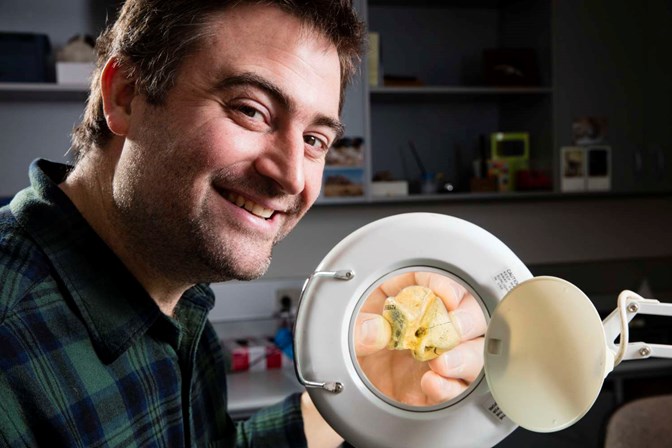Melbourne fossil find reveals deep past of world’s most mysterious living whale
A fossil representing the oldest known evidence of the pygmy right whale, the greatest puzzle of the whale world, provides evidence that the first chapter of the mystery that is today’s living species is set in Australia.
A seemingly unremarkable fossil held in the Museums Victoria’s collection for over 60 years, has been identified by paleontologists as the oldest known evidence of the enigmatic living pygmy right whale, proving that it most likely originated in the southern ocean and has a history in Australia that stretches back more than 5 million years.
Collected at Beaumaris in Melbourne’s bayside by a former Museums Victoria paleontologist George Baxter Pritchard in the 1950s, it was immediately identified as a whale ear bone. But its immense significance was not fully recognised until late 2017 when current Museums Victoria paleontologist Dr Erich Fitzgerald and a research fellow, Dr Felix Marx, were looking at whale ear bones in the museum’s Paleontology Collection storeroom and made the exciting discovery that it belonged to the pygmy right whale.
Dr Erich Fitzgerald said: "What began as puzzlement rapidly shifted gears to astonishment as it dawned on us just what we were looking at - the unmistakable periotic bone of a pygmy right whale."
Considered one of the least know and most bizarre living whale species, the pygmy right whale (Caperea marginata), is the smallest, has strange overlapping ribs not seen in other marine mammals and unusual visual capabilities for a baleen whale. Put simply, among whales the pygmy right is the odd one out.
What we do know about its evolution has been garnered from just six fossils worldwide, some of which are only uncertainly identified –including one other possibility in Museums Victoria's Paleontology collection which was also found at Beaumaris in the early 20th Century.
To study the fossil it was CT scanned so that the internal structures of the inner ear could be measured and studied. This further revealed that the fossil was very similar to the living species of pygmy right whale.
The research, published in Peer J, has involved an international team of paleontologists from Museums Victoria, Monash University, the Natural History Museum, London and Royal Belgian Institute of Natural Sciences, Brussels.
It comes after the same team made the unexpected discovery in 2017 that part of the pygmy right whale’s history occurred in the northern hemisphere, after fossils were unearthed in Japan and Italy. Thought to only exist in the southern hemisphere in Australia, New Zealand and South America, at the time this was a little like discovering a kangaroo in Scotland.
This find highlights Beaumaris, a coastal suburb of Melbourne, as one of the richest marine fossil sites in Australia and the important role it has to play in assisting scientists to unravel the evolution of marine life in Australia and the ancient history of the southern ocean.
Fossils found at Beaumaris include those of baleen whales, dolphins, penguins, seals and sea turtles and particularly significant finds include the huge tooth of a gigantic predatory sperm whale, which at 30cm is the largest ever found in Australia and fossils of Pelagornis, an enormous seabird with a wingspan of 5-6 metres.
As Dr Erich Fitzgerald explains, this find has sparked even more curiosity into the mystery of the pygmy right whale: "This find may herald Beaumaris as the key site to unlocking the origin of the weirdest whale. We now know their fossils are out there, let’s go and find more!"
The paper A Miocene pygmy right whale fossil from Australia is authored by an international team of scientists including Dr Felix Marx, Dr Travis Park, Dr Erich Fitzgerald and Dr Alistair Evans, and has been published in Peer J.
This research was supported by EU Marie-Sklodowska-Curie Actions.
Interviews available with Dr Erich Fitzgerald, Senior Curator of Vertebrate Palaeontology, Museums Victoria
For interviews, images and a copy of the paper please contact:

